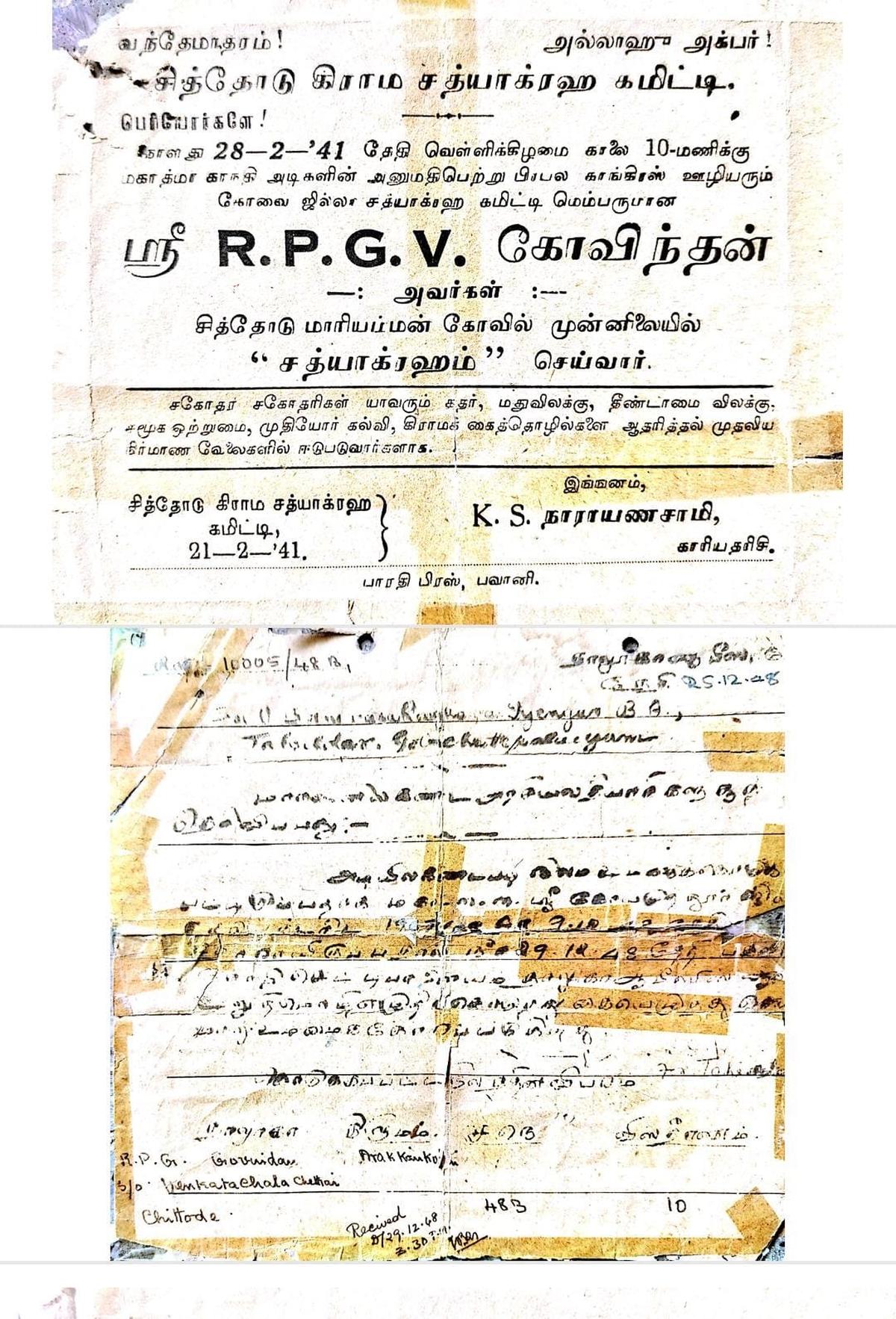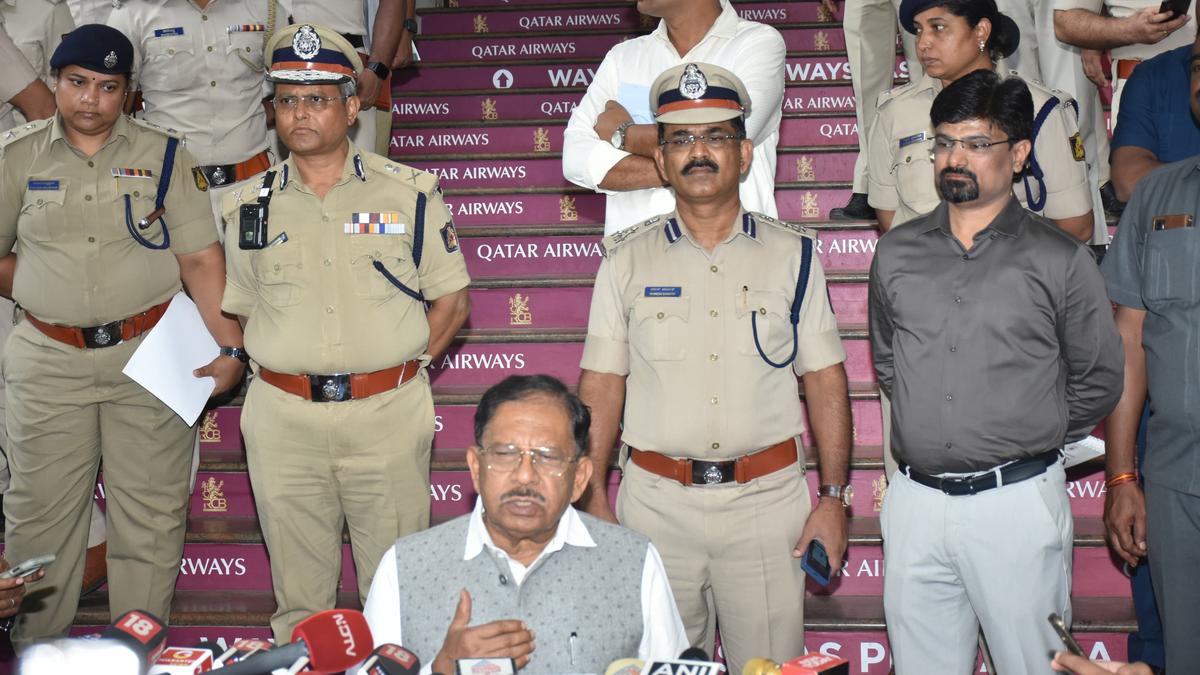
R.P.G.V. Govindan Chettiyar
| Photo Credit: Special Arrangement
Tamil Nadu’s contribution to the freedom struggle is a captivating chapter in the history of India’s fight for independence. Many unsung heroes, who devoted their lives to the nation, remain largely unknown. One such hero is R.P.G.V. Govindan Chettiyar, born on July 27,1910 to Venkatachalam Chettiyar and Guruvayammal, at Chithode, a village in Erode Taluk, which was then part of the composite Coimbatore district. From an early age, he was deeply influenced by Gandhian principles. A passionate freedom fighter and dedicated Congressman, he played a crucial role in India’s struggle for independence. Even as a school student, he participated in the Non-Cooperation Movement of 1920–21.
On February 28, 1941, as a member of the erstwhile Coimbatore Zilla Congress Committee, he led a Satyagraha near the Chithode Mariamman Temple, demonstrating his unwavering commitment to the nation’s freedom. Govindan Chettiyar was an ardent advocate of Gandhian principles. He strongly promoted the use of Khadi, believing that self-reliance in clothing would weaken the economic grip of the British. He also championed the cause of prohibition, considering liquor a social evil that hindered national progress. A staunch opponent of untouchability, he worked tirelessly for social harmony and uplift of the downtrodden. His efforts extended to promoting cottage industries, particularly in rural areas, to enhance self-sufficiency and economic independence among the poor.
Govindan Chettiyar’s patriotism was not confined to mere ideology; he took to the streets, mobilising people against British colonial rule. Between February 2, 1941 and March 9, 1941, he undertook a padayatra (march on foot) alongside K. S. Ramasamy of Gobichettipalayam (who later became the Deputy Minister for Home Affairs in the Union Cabinet), traveling through several towns and villages, including Perundurai, Kanchikoil, Chennimalai, Kunnathur, Thingalur, and Chithode, accompanied by Congress volunteers. These processions were not just demonstrations but platforms for public discourse, where he and his associates delivered powerful speeches on anti-war propaganda and the pressing need for Indian independence.

R.P.G.V. Govindan Chettiyar
| Photo Credit:
Special Arrangement
His activism reached its peak in 1941 when he actively took part in the Individual Satyagraha movement, launched in then Madras under Mahatma Gandhi’s guidance. As a result, he was arrested and sentenced to six months of imprisonment in the Madras prison. Even after his release, his spirit remained unbroken. During the Quit India Movement of 1942, when the British intensified their crackdown on nationalists, he went underground to continue his efforts against colonial rule.
After independence, he served as a member of the advisory committee for the Erode National Expansion Scheme. He organised a team of volunteers to assist those affected by the devastating Bhavani flood. In his later years, he was compelled to sell his six acres of land due to financial difficulties.His family, consisting of nine members, including his wife Renganayaki, four sons, and three daughters, faced hardships due to a low income. Suffering from eye problems, he was unable to afford the necessary medical treatment.
He had repeatedly requested the government to honor its earlier promise of providing 10 acres of free land (for freedom fighters). Additionally, he appealed to the government to retain the revolver that had been confiscated from his father under the National Security Act in 1932 due to his involvement in the Civil Disobedience Movement. Govindan maintained close political ties with prominent leaders and Congress stalwarts C. Subramaniam and K. Kamaraj. This association was evident from the letters preserved by his descendants, which highlight his active involvement in the political landscape of his time. Despite his contributions, he faced numerous personal and financial hardships in his later years. On August 2, 1993, Govindan passed, leaving behind a legacy of dedication and service.
His sacrifices and relentless efforts serve as a testament to the courage and determination of Tamil Nadu’s unsung heroes in the freedom struggle. Though his name may not feature prominently in mainstream history, his contributions remain invaluable in shaping India’s journey to independence. Even after 78 years of independence, we are still to include in mainstream history several heroes of the freedom movement like Govindan.
(The author is Head, Department of History, Chikkaiah Government Arts and Science College, Erode)
Published – June 04, 2025 07:00 am IST



Leave a Comment